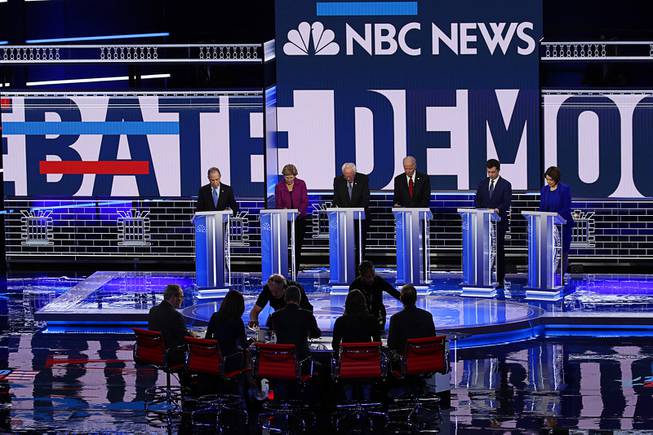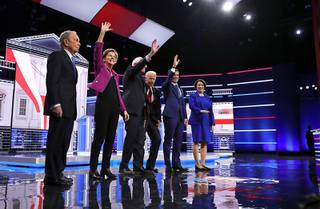
John Locher/AP
From left, Democratic presidential candidates, former New York City Mayor Michael Bloomberg, Sen. Elizabeth Warren, D-Mass., Sen. Bernie Sanders, I-Vt.,former Vice President Joe Biden, former South Bend Mayor Pete Buttigieg, Sen. Amy Klobuchar, D-Minn., stand on stage before a Democratic presidential primary debate Wednesday, Feb. 19, 2020, in Las Vegas, hosted by NBC News and MSNBC.
Wednesday, Feb. 19, 2020 | 11:15 p.m.
The ninth Democratic presidential debate turned out to be the most spirited, as the candidates for two hours at the Paris Las Vegas on Wednesday took turns questioning the others’ policies and credentials to face off in the general election against President Donald Trump.
The debate, three days before the Nevada presidential caucuses, included much criticism of former New York Mayor Michael Bloomberg, who is rising in polling and was making his debut on the debate stage.
Bloomberg received serious pushback for the “stop and frisk” policy implemented during his tenure in New York, where police were able to temporarily detain and question suspects. He was also asked about allegations of sexist and misogynistic behavior toward women, who can’t speak about his alleged actions because they’ve signed nondisclosure agreements.
Bloomberg said the sexist behavior came from reactions to jokes he told that women didn’t like. The nondisclosure agreements were signed “consensually,” he said.
It remains to be seen how the debate may help the candidates going into the caucuses on Saturday, especially with 77,000 votes cast during a four-day early voting period. The candidates targeted each other on the differences in their health care plans, dealings with Nevada’s powerful Culinary Union Local 226 and the impacts of mining and fracking on the climate.
Health care
The Culinary Union, which elected not to endorse a candidate, has been a vocal opponent of single-payer, government-run health care. Union leaders said they have been harassed by supporters of Sen. Bernie Sanders, the front-runner to win the nomination, over their concerns that their union-negotiated health care would be eliminated by Sanders’ Medicare for All plan.
Sen. Elizabeth Warren of Massachusetts and former South Bend, Ind., Mayor Pete Buttigieg both said that Sanders should take responsibility for the actions of his supporters.
“I have said many times before, we are all responsible for our supporters,” Warren said. “And we need to step up. That’s what leadership is all about.”
Sanders said that he has removed people from his campaign who have made “ugly remarks.”
“We have over 10.6 million people on Twitter, and 99.9%of them are decent human beings, are working people, are people who believe in justice, compassion and love,” Sanders said. “And if there are a few people who make ugly remarks, who attack trade union leaders, I disown those people. They are not part of our movement.”
When asked about concerns from union members about the loss of their private health insurance under his plan, Sanders said that nobody would take a hit to health care quality.
“So let me be very clear to my good friends in the Culinary Workers Union, a great union,” Sanders said.” “I will never sign a bill that will reduce the health care benefits they have. We will only expand it for them, for every union in America, and for the working class of this country.”
Warren came out hard against more moderate plans proposed by Sen. Amy Klobuchar and Buttigieg, calling Buttigieg’s a “PowerPoint” and Klobuchar’s a blank “Post-it note.”
Buttigieg called plans that would take away health care coverage negotiated by unions condescending and arrogant.
“There’s a powerful American majority ready to undertake the biggest, most progressive reform we’ve had in health care in 50 years, just so long as we don’t force it on anybody,” he said.
‘Stop and frisk’
The debate stage in the first diverse state of the nominating process was the site of Bloomberg’s first test on the issue of “stop and frisk,” the controversial program in New York City that allowed police to temporarily detain and search people. It was overwhelmingly used against minority populations.
Bloomberg’s backing of the policy was a major grilling point during the debate, with criticisms levied from multiple candidates. Sanders, Warren and Biden targeted “stop and frisk” right out of the gate, with Biden saying the Obama administration had to step in on the policy.
“He didn’t get a whole lot done (as mayor),” Biden said. “He had ‘stop and frisk,’ throwing close to 5 million young black men up against a wall. When we came along in our administration ... and said we’re going to send in a mediator, stop it, he said that’s unnecessary.”
Bloomberg said he was embarrassed on how “stop and frisk turned out.” While he did say the people should not be stopped indiscriminately, he also said that it did decrease crime rates, which has been found to be unsubstantiated.
Warren hit back hard, saying that the problem with “stop and frisk” was not how it turned out, but the thinking behind the issue in the first place.
“When the mayor says that he apologized, listen very closely to the apology. The language he used is not about stop and frisk. It’s about how it turned out,” Warren said. “No, this isn’t about how it turned out. This is about what it was designed to do to begin with.”
Immigration
For a debate held in Nevada, one of the states with the highest Hispanic population, there was very little substance on immigration or policies dealing with Mexico.
Buttigieg had a quick mention of investing in entrepreneurship in Latino communities, which he called “an investment in the future of America,” and he and Klobuchar sparred over Klobuchar’s forgetting the name of Mexican President Andrés Manuel López Obrador in a recent Telemundo interview. Klobuchar touted her support for the U.S.-Mexico-Canada Agreement, which recently replaced the North American Free Trade Agreement as the defining trade document for the North American continent.
Biden touted his experience in the executive branch and Latin American policy, and said he would set stronger foreign policy than Trump.
“I’ve met with this president,” Biden said. “I’ve met with the last president, the one before that. I’ve been deeply involved in making sure that we have a policy that makes more sense than this god-awful president we have now.”
Climate change
Las Vegas is one of the fastest-warming states in the country, and the attention paid to climate during the debate reflected that to a degree.
Biden said that companies contributing to the climate change crisis knowingly should be open to legal action.
“If you demonstrate that they, in fact, have done things already that are bad and they’ve been lying, they should be able to be sued, they should be able to be held personally accountable, and not only the company, not the stockholders, but the CEOs of those companies,” Biden said.
Bloomberg, who has business interests in China, said that he would try to negotiate with China in order to lower carbon emissions in the country.
“In all fairness, the Chinese have slowed down. It’s India that is an even bigger problem. But it is an enormous problem, (and) nobody’s doing anything about it,” Bloomberg said. “We could right here in America make a big difference by closing the coal-fired power plants. If we could enforce some of the rules on fracking so that they don’t release methane into the air and into the water, you’ll make a big difference.”
Biden and Warren both stressed that minority communities are those that are overwhelmingly hurt by climate change.
“They are the ones that become the victims,” Biden said. “That’s where the asthma is, that’s where the groundwater supply has been polluted. That’s where people do not have the opportunity to be able to get away … from asbestos in the walls of our schools.”
Warren said that she has a trillion-dollar plan to help fix the damage done to minority communities by climate change.
“For generations now in this country, toxic waste dumps, polluting factories have been located in or near communities of color, over and over and over,” she said. “And the consequences are felt in the health of young African-American babies. It’s felt in the health of seniors (and) people with compromised immune systems. It’s also felt economically. Who wants to move into an area where the air smells bad or you can’t drink the water?"
Federal lands
The use of public lands, of which Nevada is overwhelmingly comprised, came up during the debate in the context of Warren’s plan to ban fracking and mining on federally owned land.
“I think we should stop all new drilling and mining on public lands and all offshore drilling,” Warren said. “If we need to make exceptions because there are specific minerals that we’ve got to have access to, then we locate those and we do it not in a way that just is about the profits of giant industries, but in a way that is sustainable for the environment.”
Sanders, who supports a ban on fracking, reiterated that he supports the Green New Deal, legislation written by the progressive wing of the Democratic Party in the House, and said it would also boost the economy.
“The Green New Deal that I support, by the way, will create up to 20 million good-paying jobs as we move our energy system away from fossil fuel to energy efficiency and sustainable energy,” Sanders said. “This is a moral issue, my friends. We have to take the responsibility of making sure that the planet we leave our children and grandchildren is a planet that is healthy and habitable.”

